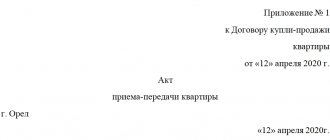An agreement for the exchange of equal apartments is an agreement under which the parties exchange real estate of the same value that belongs to them by right of ownership.
- Form and sample
- Free download
- Online viewing
- Expert tested
FILES
The subjects of an exchange agreement can be both individuals and legal entities. Thus, the parties to this agreement may be the owners of residential premises.
An agreement for the exchange of equivalent apartments must be drawn up in writing, since an oral conclusion of the transaction is possible only if the subject of the agreement in its value does not exceed the minimum wage ten times.
In this regard, below we will look at how such a document is drawn up and what nuances you should pay attention to when preparing it.
The concept of an agreement for the exchange of shares of an apartment
Peculiarities of registration between close relatives and with a minor
The need to exchange movable or immovable property appears quite often in our lives.
This is convenient, since you do not need to draw up a purchase and sale agreement and pay a large tax. As for the exchange of shares of an apartment between close relatives, there are a number of nuances and features that we will consider in the article. We also focus on situations where a transaction is concluded with the participation of minors.
Where to go?
When all the work has been completed, you can begin to formalize the apartment barter transaction between relatives. First, you need to estimate the total cost of your home and your opponent’s home. If the prices are reasonable, you can proceed to drawing up a contract, but if not, it’s worth talking about additional payment.
After this, you either draw up a contract yourself, without notarization, or contact a notary office .
There the document is checked, assigned a number and entered into Rosreestr.
If one of the parties fails to fulfill its obligations, this agreement will be good evidence in court.
Barter agreement: concept
An exchange agreement is an act that confirms the completion of a bilateral transaction on the basis of legislation. Since an agreement for the exchange of an apartment between close relatives assumes that the owner of a share of real estate and those who want to receive this share in exchange for something are both sellers and buyers, rights and obligations arise for the two parties.
Today, an exchange agreement between close relatives is very popular, as it provides for more favorable taxation. When selling an apartment, a tax of 13% of its appraised value is paid by each party, and in the case of me - a one-time tax.
The legislative framework
There is no separate law that would completely regulate this procedure, but there are a number of articles in different legislative acts.
- Article 567 of the Civil Code of the Russian Federation states that each party undertakes the obligation to place one product at the disposal of the other party. Each party is recognized as both a seller, obliging to sell, and a buyer, obliging to accept.
- Article 31 of the Civil Code of the Russian Federation. Explains the exchange procedure: if the exchanged property has the same value, the agreement is considered equal, if different, it is unequal and involves additional payment by one of the parties. The transaction is carried out only with real estate objects; it is impossible to exchange a share of an apartment for money, this will already be a purchase and sale agreement.
- Information letter dated September 24, 2002, No. 69. Explains the nuances regarding the number and names of objects subject to exchange.
Practice shows that the presence of many nuances that usually arise during such agreements requires recourse to real contracts already enshrined in court. You can find information on the official website of the district court.
Agreement for the exchange of real estate: content, form.
Exchange of living quarters.
An agreement for the exchange of real estate is understood as an agreement under which each party undertakes to transfer one piece of real estate into the ownership of the other party in exchange for another piece of real estate or another product.
According to Russian civil law, an exchange agreement is an independent type of contractual obligation, which involves highlighting the distinctive features inherent in this agreement.
The barter agreement is consensual, compensated, bilateral.
The main distinguishing features of an exchange agreement:
- focus on transferring property into ownership (this brings the exchange agreement closer to the purchase and sale agreement, for example);
— the nature of the consideration;
- the moment of transfer of ownership.
Unlike a loan agreement, under which consumable things, determined by generic characteristics (including money), are transferred into the ownership of the borrower on the terms of returning the same number of things (by weight, volume, etc.) or the same amount of money, Under an exchange agreement, the return of property similar to that received is excluded. Under a purchase and sale agreement, consideration on the part of the buyer is always the payment of a certain amount of money, while under an exchange agreement, payment of value is excluded, since goods are exchanged for goods. Under an exchange agreement, the ownership of goods received as an exchange passes to each of the parties simultaneously after the obligations to transfer the goods are fulfilled by both parties, unless otherwise provided by law (Article 570 of the Civil Code of the Russian Federation).
Chapter 31 of the Civil Code of the Russian Federation does not contain special rules on the subject of the exchange agreement, therefore it is regulated by the relevant rules on purchase and sale, if this does not contradict the essence of the exchange (clause 2 of Article 567 of the Civil Code of the Russian Federation). The condition on the subject of the contract is one of the essential ones; if real estate objects are exchanged, then each of such objects must be described in the contract in accordance with the requirements of Art. 554 of the Civil Code of the Russian Federation and clause 1 of Art. 18 and paragraph 6 of Art. 12 of the Law on Registration of Rights. Price is not one of the essential terms of the exchange agreement, even if real estate is exchanged. This conclusion is based on the fact that the rules on purchase and sale are applicable to an exchange agreement insofar as they do not contradict the essence of the exchange. Price is the expression of the value of a commodity in money, while the essence of a barter contract is the exchange of goods that are assumed to be of equal value. Consequently, if there is no monetary valuation of the exchanged real estate objects in the contract, the contract cannot be considered as not concluded, due to the fact that the parties have not reached an agreement on all essential terms. At the same time, the fact that there is no monetary valuation of the exchanged real estate in the agreement cannot be grounds for refusal of registration.
The form of the exchange agreement is not specifically defined in the law, therefore, the rules on the form of the real estate sale agreement are subject to application to the exchange agreement for real estate (clause 2 of Article 567 of the Civil Code of the Russian Federation). This means that an agreement for the exchange of real estate must be concluded in writing in the form of one document signed by the parties (Article 550 of the Civil Code of the Russian Federation).
A feature of the state registration of the transfer of ownership of real estate acquired under an exchange agreement is that such registration can be carried out only after both parties to the exchange agreement have fulfilled their obligations to transfer the exchanged real estate to each other (Article 570 of the Civil Code of the Russian Federation). It follows from this that in order to register the transfer of ownership under an exchange agreement, a transfer act or acts confirming the transfer of real estate must be submitted.
An essential condition of the agreement for the exchange of a residential building, apartment, part of a house or apartment, room is a list of persons retaining the right to use the residential premises after its transfer to the new owner. If this requirement is not met, the contract is considered not concluded, which means its registration should be refused. State registration of the exchange of residential premises is carried out according to the rules provided for by the Instructions on the procedure for state registration of contracts of sale and purchase and transfer of ownership of residential premises, approved by Order of the Ministry of Justice of Russia dated August 6, 2001 No. 233.
In case of conclusion and execution by the parties of an agreement for the exchange of residential premises, the following registration actions are performed:
- registration of a transaction - an exchange agreement;
— registration of transfer of the right to one residential premises;
— registration of transfer of rights to another residential premises.
Features of the state registration of an exchange agreement, the subject of which are real estate objects located in the territories of various registration districts, and the transfer of rights to these real estate objects are reflected in the Instructions on the procedure for state registration of an exchange agreement and (or) transfer of rights to real estate objects located on territories of various registration districts, approved by Order of the Ministry of Justice of Russia dated July 1, 2002 No. 183 (as amended on December 24, 2004). At the choice of the parties to the transaction, state registration of the exchange agreement is carried out in any of the territorial bodies of the Service operating within the registration districts on the territory of which the real estate objects that are the subject of this agreement are located, and registration of the transfer of rights is carried out at the location of each of the objects. When a territorial body of the Service receives applications and relevant documents for state registration of an agreement of exchange and (or) transfer of rights to one of the real estate objects, this territorial body of the Service on the same day sends a message about this and a copy of the agreement to the second territorial body of the Service for the purpose of entering the second territorial body of the Service records in the Unified State Register about these statements, indicating the existence of a legal claim in relation to the real estate object specified in the exchange agreement and located on the territory of the registration district within which the territorial body of the Service operates at the location of the second object. In the message, the territorial body of the Service also requests from another territorial body of the Service information about the registered right to the corresponding real estate object, about registered restrictions (encumbrances) of the right, as well as about the existence of legal claims to this real estate object. Within 5 days, the second territorial body of the Service reports to the territorial body that registers the transaction the available information about the object, rights to it and encumbrances. After a decision is made to register a transaction, within 5 days, information about the registration of the transaction and the transfer of rights is sent to the second territorial body (the date of registration and registration number are reported); in case of refusal to register or suspension of registration, a copy of the message is sent. After registering the transaction and transfer of the right by the first territorial body, the second registers the transfer of the right to another object, taking into account the verification of the legality of the exchange agreement carried out by the first territorial body.
An approximate list of title documents submitted during state registration of contracts for the exchange of housing assets:
— statements of the parties to the agreement or their authorized persons (the form is issued upon application);
— a document confirming payment for registration (original and copy);
- individuals (including representatives) - identification documents (to be presented). Legal entities - constituent documents, as well as a document confirming the fact of entering information into the unified state register of legal entities, and a document confirming the registration of a legal entity as a taxpayer indicating its Taxpayer Identification Number (originals and copies). If the file of title documents already contains copies of these documents, then it is possible to submit an extract from the unified state register of legal entities, indicating the absence of changes and additions to the constituent documents of the legal entity;
— documents confirming the authority of the representative (original and copy): power of attorney; certificate of a guardian (trustee) - for guardians (trustees) of minor children, citizens limited by the court in legal capacity or incompetent; adoption certificate - for adoptive parents;
- originals of the exchange agreement (usually in a quantity equal to the number of parties to the agreement, as well as one for inclusion in the file - for an agreement in simple written form;
- originals of the agreement and one notarized copy or, at the discretion of the applicant, another original copy of the agreement - for an agreement in notarized form);
— the original and a copy of the title document of the person alienating the residential premises (agreement, certificate, etc.) or the original if the rights are registered in the Unified State Register;
— a document confirming the transfer of real estate (if the terms of the agreement and the application allow for simultaneous registration of the transaction and the right);
— originals and copies of documents confirming fulfillment of the terms of the contract in cases where the transaction was concluded under a condition (Article 157 of the Civil Code of the Russian Federation);
- cadastral passport of a residential premises (original and copy certified by the authority that issued this document);
— consent of the guardianship and trusteeship authorities (when making a transaction to dispose of residential premises in which minors, partially or completely incapacitated citizens live, as well as if they are the owners of the alienated real estate);
- other documents confirming the grounds for the transaction, provided for by the current legislation and necessary for registration (notarized consent of the spouse to the transaction; confirmation of compliance with the requirement for the pre-emptive right to purchase a share in the common property right of co-owners; written consent of the person in whose favor the encumbrance is established - the rentee , mortgagee; decision of an authorized body of a legal entity to complete a major transaction/transaction in which there is an interest, etc.)
Deputy Head of Registration Department
transactions with real estate objects A.R. Grigoryan
Advantages of drawing up an exchange agreement
The main advantage of the deal is reduced tax. After all, during the purchase and sale, each party pays 13% mandatory tax on the transaction. An exchange agreement between relatives involves a one-time payment of tax, which significantly saves the budget of each party.
The second advantage is a simplified procedure for establishing a new ownership right, which takes much less time to complete.
The third advantage is the functionality of the act itself. There is no official structure of the contract; the parties can specify in it all the nuances for maximum benefit - from additional payments to responsibilities.
Rights and obligations of the parties
This section is compiled to indicate the obligations of the Counterparties under this agreement. Interpretations of the wording of obligations may look different due to the current principle of freedom of contract in the Russian Federation. We, in turn, will try to highlight the main provisions that are prescribed in such documents:
The parties have the right to: • Demand the transfer of ownership of the residential premises specified in the clauses on the subject of the agreement. The parties undertake to: • Transfer to each other the apartments specified in the text of the document that correspond to the characteristics stated in the agreement. • Re-register ownership of apartments within 3 (three) days from the date of signing the agreement. • Fulfill your obligations in strict accordance with this agreement.
Form for drawing up an agreement for the exchange of shares of an apartment
The exchange agreement is drawn up on a white sheet of A4 paper in printed or written form. The sheet should be clean, smooth, not wrinkled. You need to use black or blue ink; in the case of a printed version, standard font and text size, without indents, additional characters or color highlights. The document is notarized, a specialist checks the correctness of the agreement from a legal point of view, and also finds out all the subtleties of the exchange, for example, to what extent the parties’ share is equivalent.
Standard information about the exchange agreement:
- passport details of the parties involved in the agreement;
- an accurate description of the objects of exchange;
- the amount of the difference in the cost of objects, if the contract provides for it;
- the procedure for carrying out the exchange procedure itself is indicated: the sequence of releasing square meters, extract, registration, etc.;
- special conditions, life situations, force majeure circumstances (if this happens) are listed;
- responsibility of the parties for fulfilling the terms of the agreement;
- actions in the event of force majeure, etc.
The structure looks like this: title - date and place of preparation - names of the parties - subject of the agreement - exchange procedure - responsibility of the parties - special provisions - conclusions.
The more detailed the exchange agreement is drawn up, the fewer problems and nuances will arise after its registration, in practice. All data on the share of real estate must be entered into the act: size, location, cadastral number, who it is registered with, etc.
Registration procedure
The drawn up agreement for the exchange of shares in apartments between relatives is not yet a final document authorizing the transaction. Participants must simultaneously contact Rosreestr and submit applications (a sample is offered by the institution). The registrar, along with the application, accepts a receipt for payment of the state fee. 30 days are given to verify the act. If any discrepancies or questions arise, the contract may be referred to the court for review.
Situations when a transaction is invalidated
There are a number of circumstances under which an exchange may be declared invalid by a court:
- A deliberately false transaction with the aim of concealing income.
- Lack of permission from the guardianship and trusteeship authorities.
- Participation of an incapacitated person or an elderly person.
- The emergence of new circumstances.
Responsibility of the parties
This section provides information about the circumstances under which the parties bear financial responsibility. Below we present the main provisions that may be written in the text of the document:
The parties bear financial liability in the event of non-fulfillment or improper fulfillment of obligations under this agreement. Counterparties are responsible for deficiencies in the alienated objects if they are identified after signing the agreement. If these shortcomings were discussed before signing the agreement, the parties do not bear responsibility.
Features and nuances
If you want to carry out the procedure for exchanging shares of apartments, you need to obtain the consent of the remaining owners. It is important to find out in advance how commensurate your share is with the other one offered for exchange. If not, find out the amount of the surcharge. To avoid paying tax, you can register a gift between relatives.
During the process, many nuances can arise. That is why it is important to involve a competent notary in the procedure, who knows all the “pitfalls” in advance and will be able to initially draw up a document that is correct, from a legal point of view. Contact our notary office to protect yourself from unequal transactions and fraud. Ivanov Boris Sergeevich is an experienced specialist who will help you draw up an exchange agreement quickly, legally and on the most favorable terms for you.
Treat your share of property responsibly, because, sadly, the world is full of people who want to deceive you.
Trust not the words of relatives, but the recommendations of an independent specialist - a notary! Make an appointment
What is a related apartment exchange?
A relative exchange of apartments is a civil transaction involving properties owned by relatives.
In contracts and other documents, only distant or close relatives are parties to the agreement (for example, grandfather and grandson, sister and brother, etc.). The Civil Code of the Russian Federation and the Housing Code of the Russian Federation do not contain special nuances for concluding real estate contracts between relatives. However, in some cases, parties can do without paying taxes that are provided for standard options for transferring rights to housing. The procedure for citizens planning to exchange their property assets will depend on the form of the transaction and the status of the property.
Privatized apartments can be exchanged or sold without additional permission from government or other agencies. The only exception is a transaction in which the property right of a child is alienated. If the housing is municipally owned and provided under a social rental agreement, the landlord will give consent to the exchange.








